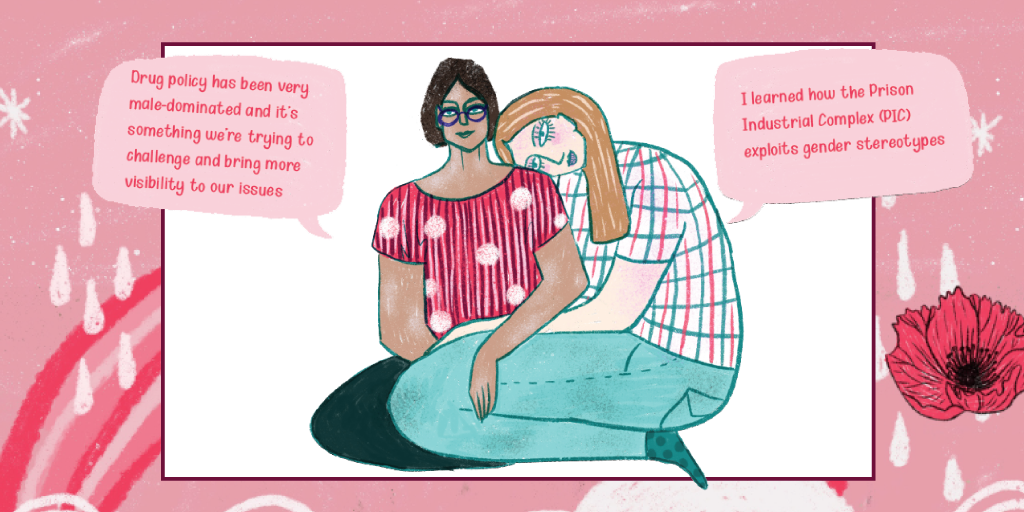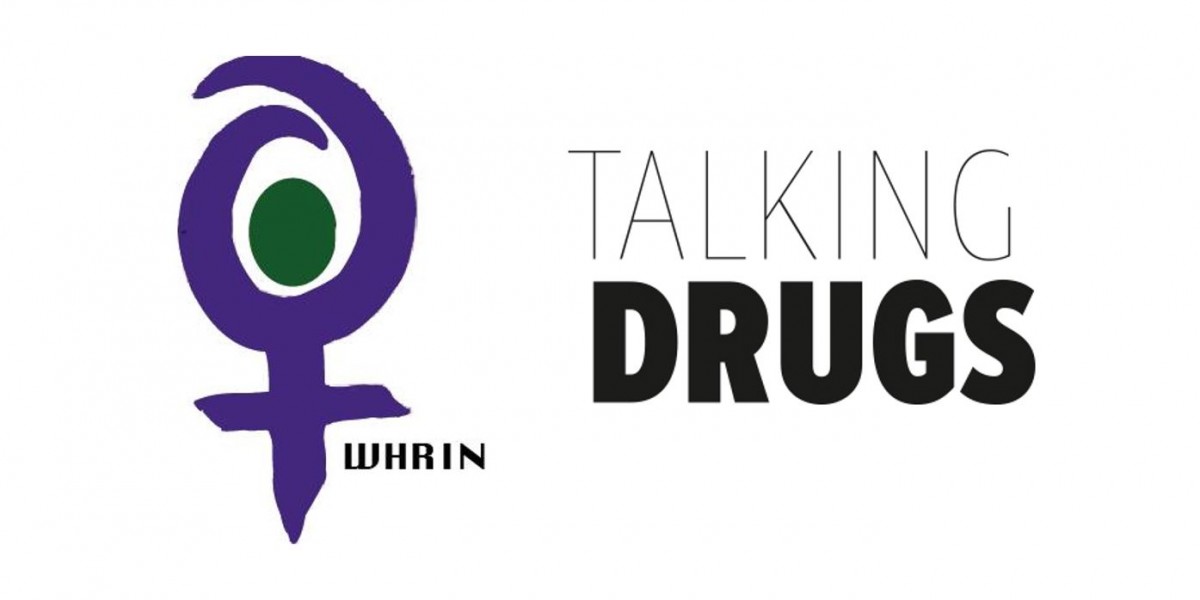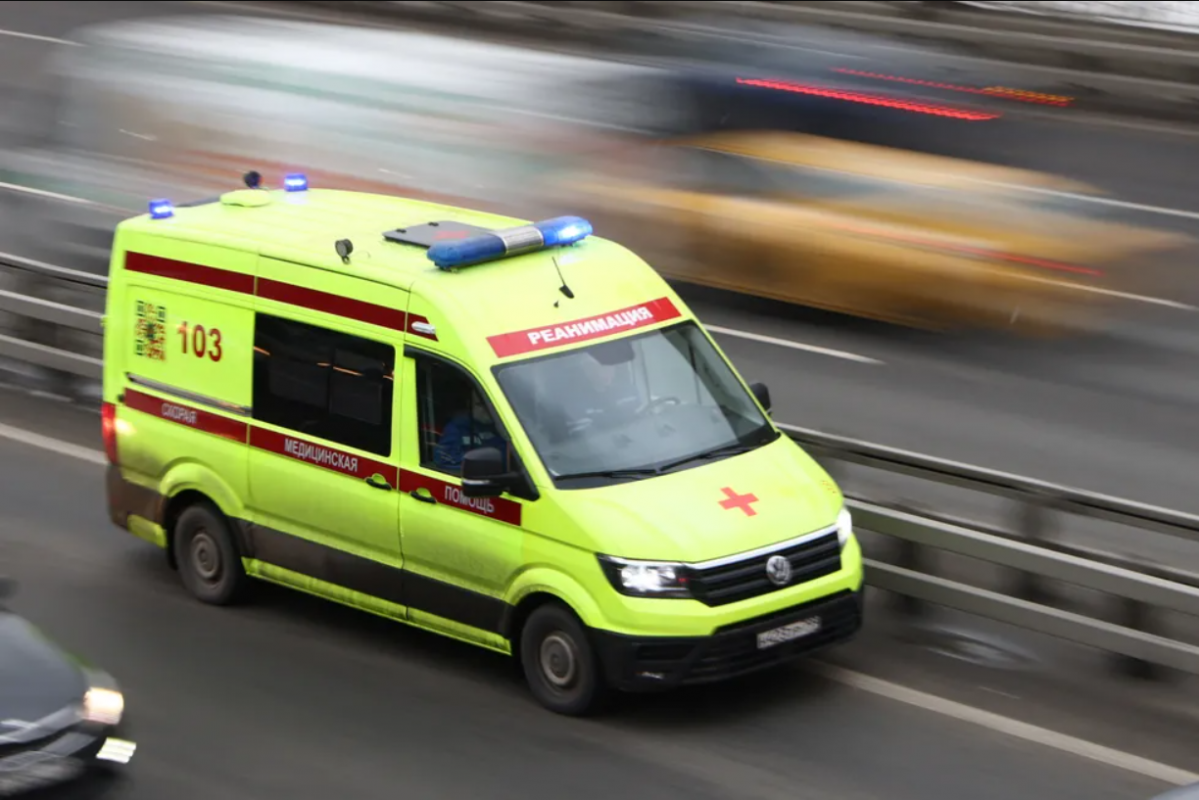The Women and Harm Reduction International Network and TalkingDrugs position statement on women who use drugs and the violence of law enforcement is published on December 10th 2019, International Human Rights Day, also marking the conclusion of the UN 16 Days of Action to Eliminate Violence Against Women.
Gender, drug use and violence
This statement serves as the beginning of a joint effort to recognise and address the specific needs and experiences of women who experience the violence of law enforcement in the context of punitive and prohibitionist drug policy. It acts as both a public expression of solidarity and as a call to action to find new, immediate ways to reduce the harm experienced by women who use drugs.
Because the war on drugs is fuelled by the criminal justice system, people of all genders experience the violence and harassment of law enforcement in relation to drug use in their everyday lives. Conversely, people with marginalised gender identities experience specific forms of gendered harm whether or not we use drugs or are directly impacted by drug laws. In effect, women and gender non-conforming (GNC+) people are at risk of gendered violence whether or not we use drugs, while the stigma and discrimination levelled at people who use drugs means that we are often turned away from or further harmed in supposed ‘places of safety’ when we do use drugs.
This violence includes, (but is not limited to) rape, sexual harassment and extortion, loss of child custody, imprisonment for mere personal possession, extra judicial killing, capital punishment and penalisation for drug use in pregnancy and parenthood. The intersection between gender and drug prohibition brings specific, overlapping forms of harm requiring specific and intersectional responses.

In February 2019, more than 40 womxn from Europe and Central Asia met in Barcelona to work together on intersectional feminism, drug policy, harm reduction and human rights. This is where the Barcelona Declaration was initiated.
An abolitionist framework
This position statement will not offer specific recommendations for reform to address such harm; instead it will serve as a pin-board to gather resources and strategies for organisations and individuals to develop responses to the harm of law enforcement on women and GNC people who use drugs in their local context. This is for two main reasons:
- Strategies for healing from and reducing harm will necessarily change depending on the geopolitical and legal context. Each community of women/GNC+ people and their allies must build their strategies by working from the ground up, centred to the experiences of those who are experiencing harm first hand.
- Strategies are subject to change in relation to factors often outside of our control. Therefore, it is more useful to offer a framework that can be used in different and changeable contexts, in both the short- and long-term. Such a framework for building strategies is grounded in a political understanding of harm and responses to such harm. Once the core principles of a community’s responses to harm are made clear, building strategies for ourselves becomes a more accessible process and results in more powerful and sustainable demands.
For the purposes of this position statement, we will offer an abolitionist political framework to responding to the harm of law enforcement on women/GNC+ people who use drugs.
Abolition is about working towards a world without police, prisons and surveillance. In practice, this means developing new ways of responding to harm, healing from harm, and holding each other accountable for the harm that we ourselves produce. We need responses that allow survivors to heal from the harm they have experienced, and that tackle the root causes of such harm by transforming our formal and informal commitments to carcerality and criminal justice as the sole pathway to creating safe communities. In the context of drug policy, this means reinforcing our efforts to decriminalise drug use, possession and supply so that women/GNC+ people who use drugs are protected from the violence of law enforcement in relation to drugs. Bringing an end to the prohibition of drugs is an essential part of creating safe communities.
In our response to the violence of law enforcement against women/GNC+ people who use drugs, we can extend the philosophy of harm reduction to align with abolitionist principles. Focussing on reforms that, for example, criminalise law enforcement for the harm they cause, in effect fuels the very system that we are trying to dismantle. Instead of punishing and harming people who exhibit violent behaviour (which can become a cycle which does not prevent the recurrence of violence), we can choose to use our – often limited – resources to support our own communities to develop new ways of healing from and responding to harm. We can choose to tackle the root causes of both gendered violence and stigma and discrimination against people who use drugs. This ongoing practice of tackling the root causes of the harm we experience is both a daily effort and a long term strategy for sustainable change, for ourselves and the communities we live in.

It is critical for feminist movements to develop awareness of the gendered, racial and class aspects of repressive drug policies and the associated criminalization and stigmatization of people who use drugs. Source: AWID
A pin board for reform
Our ‘pin board’ for reform seeks to make the long term goals of abolishing prohibition, policing, prisons and surveillance (and finding more immediate, practical alternatives to addressing harm) more possible.
We support the eradication of the multiple layers of stigma and discrimination that women/GNC+ people who use drugs experience, creating the conditions for the expansion of intersectional, accessible harm reduction resources and services equipped to support all kinds of women/GNC+ people who use drugs. This includes those who are impacted by the violence of law enforcement indirectly through partners, families and communities as well as those who are directly and egregiously impacted. One of the most pressing barriers that women/GNC+ people who use drugs face is that there are actually very few places (or no places whatsoever) that are accessible and that cater to our overlapping and complex needs.
For example, there are multiple services that should be ‘places of safety’ for women/GNC+ people who use drugs but that in reality have policies such as exclusion, forced abstinence or forced treatment. There may be a women’s refuge that stigmatises against people who use drugs, or a harm reduction facility that is transphobic, homophobic, or ill-equipped to support somebody who has experienced physical or sexual trauma. There are countless examples of places that are completely inaccessible to people who experience a range of disabilities, or that are completely hostile to people who engage in sex work. Many services are unable to legally offer resources to people without citizenship.
So, we must ensure that those women/GNC+ people who use drugs and who also experience poverty, racism, transphobia, homophobia, whorephobia, fatphobia, ableism, sexual violence, and classism are not forgotten, silenced or devalued by our demands, but are instead respected, listened to, centred and advocated for through our work. If we don’t advocate with and for all of us, we reinforce the marginalisation and harm that we profess to be working against.
Below are some resources and case studies that have been developed by women/GNC+ people; people who use drugs; racialized people; abolitionists; people dedicated to transformative justice; and transfeminist community organisers, that are useful for developing your own recommendations and responses to the violence of law enforcement in your contexts.
Do you have any case studies or further resources that should be added to this list? Get in touch! Contact: rlbirgin@yahoo.com.au
Resources and case studies
Urban Survivors Union, US. The White Cross Crew was initially created as a response team for people who use drugs and it quickly became clear that women have an acute need for such services. Women who use drugs often work and live in underground economies and calling 911, even when we feel we are in danger can create a situation where we are put in a greater amount of harm precisely because the police are called.
As our harm reduction services became legal it became harder to engage in some of the work we were able to do as an underground agency. We cannot advertise these services therefore we mostly serve our participants and the homeless community.
We feel it is necessary to mitigate the damage and the harm caused by encounters with the police and prison system. We do this by offering know your rights trainings. We also provide realistic strategies for avoiding interactions with police altogether. We then offer a set of instructions to mitigate the risk of harm if one does have an unavoidable encounter with police. We ask our members to document and record all negative encounters to help us fight for prison abolition and reinforce the need for immediate change.
USU members are currently being trained in restorative justice circles, community circles, and healing justice. We are also learning as we go. We understand that we are all at risk doing this work therefore we go out in teams, but we know we are all safer if the police are not involved. Responses involve reversing overdoses; removing drugs from a scene; negotiating crisis and settling conflict; building community and providing accountability for our members.
The crisis we see among the police and their behaviour cannot be ignored. We know we must do more than prevent injury, death, as well as unnecessary and arbitrary arrest.
Contact: Louise: louise@urbansurvivorsunion.org
COUNTERfit. We often get reports of violence against women who use drugs who also do sex work. These instances are most often from dates but also from police themselves, and therefore reporting to police is ineffective and potentially more dangerous. Instead, we offer other options for support.
We have a number of female-identified staff who do gender-specific work, including support and counselling. We have a weekly drop-in for women who use drugs to get together for breakfast, which provides a safer space for sharing information and support. We also work in partnership with Maggie’s, the Toronto Sex Workers Action Project (an organization run for and by local sex workers). Maggie’s supports and distributes the Bad Date Book, where sex workers can send reports of bad dates, and it’s shared across the city to keep workers informed.
Rhiannon: At COUNTERfit Harm Reduction Program, Toronto, Canada. rthomas@srchc.com
Shared safety strategies in Sweden.* Inspired by the #MeToo movement, this initiative is led by women who use drugs to promote street safety. It is a simple model, easy to replicate and costs almost nothing but paper and printing.
We started a Facebook group where we (i.e. drug using women) share experience, asking for advice and support each other; an online self-help group for women who use drugs and sell sex, with a focus on safety. It is moderated by a woman from the local user organisation. We collected stories from everywhere through our networks with drug using women, on and off-line; at the user organisation, outside the needle and syringe programme and outside OST clinics.
We listed the most common situations according to the collected stories to identify scenarios where violence was most common and also asked the women we meet; “what to do, to protect ourselves in the identified dangerous situations?” The result is a flyer with a simple list of ‘do´s’ and ‘dont´s’.
We distribute the flyers to clinics (waiting rooms) social services, user organisations, needle syringe programme etc. And of course, to the women we meet! It needs updates over time.
Contact: Christina – kikkipaulsrud@gmail.com or Anke – Anke.Stallwits@eh-freiburg.ekiba.de
* Sharing knowledge and experiences in person and the development of best practice / knowledge sharing of harm reduction tactics is an essential part of building resilient communities and concrete, empathic relationships. It is vital that all involved in online community building are aware of the threat of surveillance from the state or others. There is no completely safe way to discuss criminalised activity when you are online. So it is important to understand the risks of cyber activity and to take every step to reduce the harms of online spaces. This could include ensuring that all admissions of criminalised activities remain offline, or by using encrypted platforms, by remaining anonymous or by taking steps to ensure the safety of all involved in online discussion groups, particularly on social media, where you are not protected from surveillance.
Club Eney, Ukraine. Our idea is to find partners among human rights defenders, administration, NGOs, communities and join forces to counter gender-based violence. We needed a clear help algorithm for a woman who uses drugs if we redirect her from harm reduction programs to other services. We implemented WINGS methodology in Harm Reduction programs, where outreach workers directed women who use drugs to WINGS groups with peer facilitators from community, training, support and mobilization for women who are in violence situations. We have psychologists in friendly organizations.
Unfortunately we don`t have shelters for women who use drugs (WUD) because rules of shelters for women in situations of violence discriminate against WUD but WUD can access one shelter with the social support of a peer outreach worker. Also we have churches where WUD can live for some time. We haven’t any safe spaces for WUD in situations of violence but we have community centers (office of NGO) where WUD can come and get support and consultation. We have a hot line against violence with consultations of psychologists. So when WUD are in need, they can come to our NGO Club Eney provider of harm reduction program as a safe space (community center), WUD participate in WINGS sessions, get support, develop safety plans, get information about shelter and psychologists and tolerant doctors.
For more information, contact Velta at: velta.parhomenko@gmail.com
Metzineres, Environments of Shelter for Women who Use Drugs Surviving Violence, Barcelona. Metzineres applies an approach for women who use drugs who experience multiple and intertwined factors of social exclusion and otherwise compromised access to health and social services. These factors include homelessness, surviving violence, sex work, undocumented migrant status, and being women of trans experience – all of which can increase vulnerability to police harassment.
The approach includes a full spectrum of harm reduction services at the Metzineres Drop-In Center, including spaces for the supervised consumption of illicit substances, respite beds to sleep in during the day, social and medical support. Those who need are provided support to navigate access to more specialized services, through arranging referrals and accompanying participants to detox centers, methadone maintenance programs, mental health services, hospital services for survivors of violence, and other social and health services.
In addition, training, occupational, cultural and leisure activities, deploying a wide range of choices for self-healing, bonding, wisdom sharing, self-defence, solidarity and mutual support are offered. Through these activities, the program seeks to build spaces and communities based on self-sufficiency and self-management where women feel safe.
Contact: metzineres@metzineres.org Web page: metzineres.org
SisterSpace. The harm reduction service in Vancouver that is an overdose prevention site for women-only SisterSpace, is built on the idea that women who use drugs need safe spaces. It is described here https://atira.bc.ca/what-we-do/program/sisterspace/ We interviewed some of the staff who talk about violence against women, and created a short video clip thinking about the connections:
Web: http://bccewh.bc.ca/
Queer Appalachia Harm Reduction. Queer Appalachia, try to shed light on the urgency of the opioid crisis in the region and seek to emphasize that nobody – regardless of addiction status – is disposable. With the disheartening and exponentially increasing rate of opioid use in Appalachia, there is nobody in the region who doesn’t play a role. As if being queer in rural regions isn’t isolating and ostracizing enough, the addition of opioid dependency only further exacerbates these experiences. The number of people experiencing problematic substance use in Appalachia increases significantly when you look at folks with queer identities. We believe in creating the world we want to see, putting actions behind our words, and not waiting on the powers that be to do what needs doing.
Queer Appalachia responds to our community's needs by offering Harm Reduction trainings and supplies. We share a mobile Harm Reduction Unit with the Virginia Harm Reduction Coalition. We offer Narcan, Naloxone, home HIV test kits, fentanyl test strips, emergency contraception, sharps containers, RX disposal bags, on-the-spot testing for Hep C, & more.
Email: queerappalachia@gmail.com Web: https://www.queerappalachia.com/
Further Resources
TOWARDS AN ABOLITIONIST DRUG POLICY REFORM
- https://www.talkingdrugs.org/towards-an-abolitionist-drug-policy-reform
- https://www.youtube.com/watch?v=Rg9hnsKFmpc
FEMINIST MOVEMENTS AND WOMEN RESISTING THE WAR ON DRUGS, AWID
- https://www.awid.org/sites/default/files/atoms/files/wud_report_-_english_-_finalsmall.pdf (Eng)
- https://www.awid.org/sites/default/files/atoms/files/wud_report_-_russian_-_finalsmall.pdf (Rus)
PUTTING TOGETHER THE PUZZLE: STIGMA, DISCRIMINATION & INJECTING DRUG USE
INVISIBLE NO MORE: POLICE VIOLENCE AGAINST BLACK WOMEN AND WOMEN OF COLOR, Andrea J. Ritchie
- http://www.beacon.org/Invisible-No-More-P1275.aspx
- http://invisiblenomorebook.com/wp-content/uploads/2018/02/INM-Study-Guide.pdf
POLICE REFORMS YOU SHOULD ALWAYS OPPOSE, Mariame Kaba
WHAT ABOLITIONISTS DO, Mariame Kaba, Dan Berger, David Stein
THE PRISON INDUSTRIAL COMPLEX IS….
- http://www.thepicis.org/resources/
- http://www.prisonabolition.org/what-is-the-prison-industrial-complex/
WHY ABOLITION?
- http://www.prisonabolition.org/why-abolition/resources/
- https://twitter.com/i/lists/1007276303014354949?s=20
CRITICAL RESISTANCE
- https://static1.squarespace.com/static/59ead8f9692ebee25b72f17f/t/5b65cd58758d46d34254f22c/1533398363539/CR_NoCops_reform_vs_abolition_CRside.pdf
- http://criticalresistance.org/resources/addressing-harm-accountability-and-healing/
CARCERAL FEMINISM
- https://transformharm.org/carceral-feminism/
- https://www.jacobinmag.com/2014/10/against-carceral-feminism/
- https://www.opensocietyfoundations.org/events/righting-carceral-feminism-s-wrongs-metoo-era
Do you have any case studies or further resources that should be added to this list? Get in touch! Contact: rlbirgin@yahoo.com.au
* The Women and Harm Reduction International Network (WHRIN) is a global platform working to accelerate the implementation and expansion of gender responsive harm reduction for women. The vision of WHRIN is that all self- identified women who use drugs have unfettered access to available, quality, relevant health, social and legal services in a context of upholding human rights without stigma, discrimination or criminalisation.


